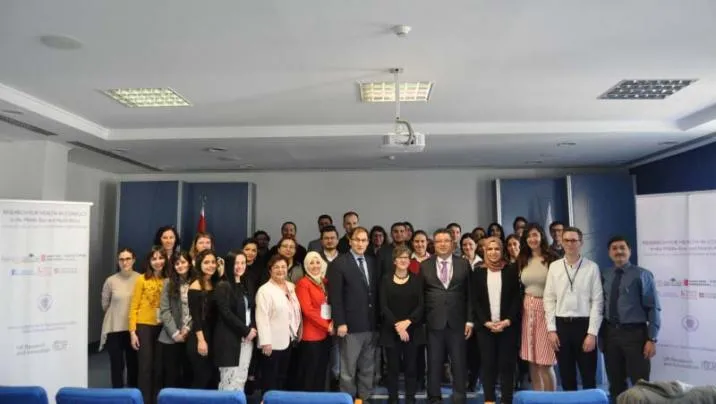An R4HC Course on
“Qualitative Research Methods for Mental Health in War and Conflicts”
15 – 18 April 2019, ANKARA-TURKEY
The R4HC-Turkey “Health and Conflict” work stream organised and hosted the certified ‘Qualitative Research Methods for Mental Health in War and Conflict’ course. The course has been developed by researchers from Birzeit University (BZU) in Palestine and King’s College London (KCL) in the UK who came to teach it at Hacettepe University over four days from 15-18 April 2019. The teaching was delivered by Dr. Hanna Kienzler and Dr. Nancy Tamimi from KCL; and Dr. Weeam Hammoudeh from BZU; with assistance from Dr. Gamze Aktuna and Dr. Fahad Ahmed from Hacettepe University and Mathias Regent from KCL.
This intensive course focused on qualitative research skills and introduced participants to (mental) health in war and conflict, the value and process of qualitative research, and ethical procedures and challenges; how to design research projects, formulate research questions, and recruit participants; different data collection methods such as observations, semi-structured interviews and focus group discussions; and data analysis and dissemination including conference posters, infographics and oral presentations.
An interdisciplinary and international group of 29 highly motivated students attended the course. They included students from different universities including Hacettepe, Ankara, Baskent, Gazi, Mersin and Mustafa Kemal University, and Hatay as well as various institutions with a focus on public health, psychiatry, demography, social work, medical ethics and pediatrics, and oncology. Students were exposed to theory while also having ample opportunity to apply the learned concepts via practical and interactive activities throughout the course. Upon successful completion of the course, participants received a certificate jointly issued by Hacettepe University, Birzeit University and King’s College London.
Participants praised the course for its interactive nature, the teamwork, the practical exercises, and the immediate feedback on their work. One participant wrote, for example, “[the course] was really useful and all lectures were really helpful. (…) the course topic was interesting and new for me and my expectations were met” while another participant praised the “content and selection of topics (…); lecturers from different backgrounds, regions and institutions; excellent educational materials and handouts; participatory sessions; and good organisation”. Participants highlighted that they would like higher-level follow-up courses in the future with a focus on different methods of data analysis, conducting literature reviews, and practical exercises for data collection. Overall, the enthusiasm of presenters and positive spirit of the participants made this course successfully.
Considering that there are 3.5 million of Syrian refugees residing in Turkey, it is hoped that participants will apply their newly won skills by conducting (mental) health research among refugees and migrants in an effort to develop evidence-based (mental) health care interventions in the context of Turkey.
